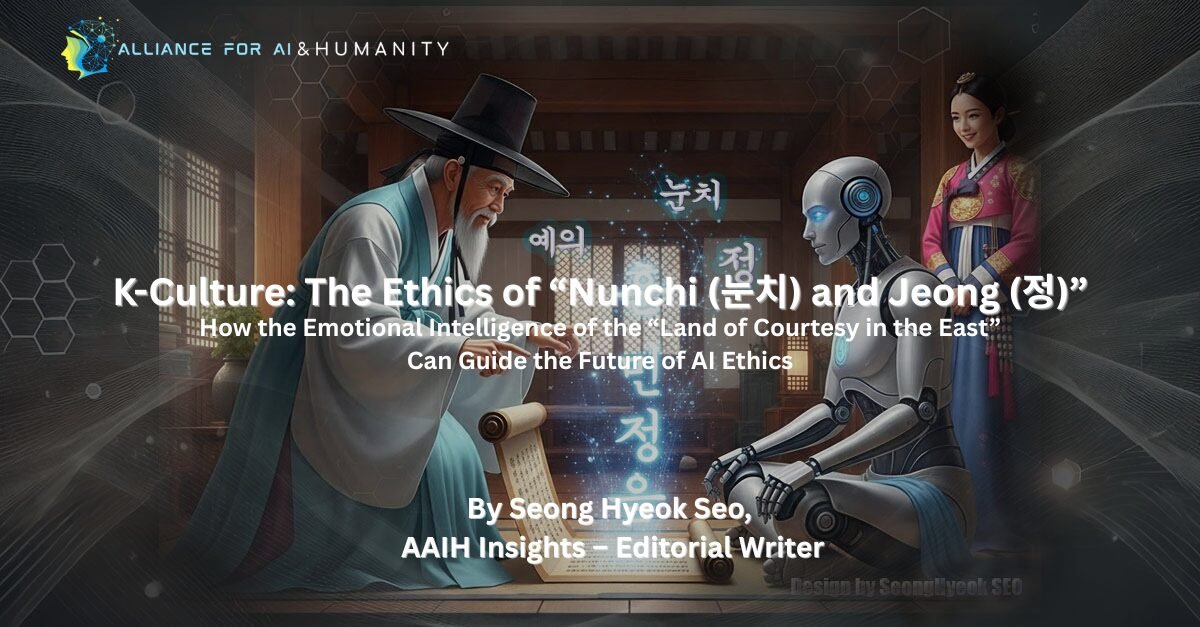K-Culture: The Ethics of “Nunchi (눈치) and Jeong (정)”

The State of AI Ethics at end of 2025: From Beautiful Principles to Messy Implementation By:-
Seong Hyeok Seo ( Fellow AAIH Insights – Editorial Writer)
The contents presented here are based on information provided by the authors and are intended for general informational purposes only. AAIH does not guarantee the accuracy, completeness, or reliability of the information. Views and opinions expressed are those of the authors and do not necessarily reflect our position or opinions. AAIH assumes no responsibility or liability for any errors or omissions in the content.
- Introduction — Three Rhythms that Have Sustained Humanityㅡ
Courtesy (ye-ui, 예의), Nunchi (눈치), and Jeong (정)
Korea has long been known as “The Land of Courtesy in the East”—
a phrase first used in ancient China, meaning “a nation in the East enlightened in the art of propriety.”
Yet courtesy (ye-ui, 예의), nunchi (눈치), and Jeong (정) are not relics of the past.
They remain the codes of emotional intelligence that continue to guide how Koreans live, relate, and express respect.
If courtesy preserves the form of relationship,
then nunchi (눈치) is the art of sensing and adjusting the emotional flow within it.
Formed from “nun (눈, to see) and chi (치, the flow of feeling)”,
nunchi (눈치) means reading subtle cues in a person’s expression, tone, and atmosphere—
a form of social attunement that keeps relationships smooth and balanced.
It is not the skill of avoidance or submission,
but the rhythm of consideration that preserves harmony and respect.
In contrast, Jeong (정) is the warmth of continuity.
It is not mere fondness, but the emotional bond built through shared time—
a mixture of care and responsibility that transforms connection into moral endurance.
The reason relationships in Korean society rarely sever easily
is because nunchi (눈치) and Jeong (정) operate together as cultural rhythm.
If these three values were re-coded today
as an ethical algorithm understandable to AI,
they could become the foundation for machine conscience:
a rhythm that considers before acting,
senses before judging,
and cares before calculating.
In Korea, ethics has always lived between people.
We read silence more than words,
felt hesitation more than expression,
and shared warmth without language.
These emotional rhythms, refined through centuries of relational history,
remind us that ethics begins not from law or logic
but from mindfulness, empathy, and respect.
- The Ethical Structure of Nunchi (눈치) and Jeong (정)
Nunchi is the rhythm of perception—
a quiet intelligence that perceives the heart before words arise,
the art of emotional timing and subtle awareness.
It is knowing when to speak, when to step back, and when to wait.
Jeong is the warmth of continuity,
the emotional connection that grows over shared life and care.
It is more than affection; it is the force that turns familiarity into responsibility.
Together, courtesy (ye-ui, 예의), nunchi (눈치), and Jeong (정) form a moral grammar of relationships,
built on the belief that
“To be ethical is to be emotionally awake.”
Every interaction—whether between humans or between human and machine—
carries an emotional frequency that deserves respect.
This is not sentimentality, but a system of harmony and balance.
If Western ethics begins with autonomy and logic,
Korean ethics begins with awareness and attunement—
a form of intelligence that values proportion over precision and balance over control.
- From Cultural Wisdom to Technological Design
As AI becomes woven into daily life,
it requires more than reasoning or technical alignment.
It requires emotional calibration.
Today’s AI can recognize faces, interpret language, and optimize results,
but it still fails to grasp the human context—
the invisible air, mood, and warmth that shape meaning.
If AI could learn the principles of “courtesy (ye-ui, 예의), nunchi (눈치), and Jeong (정)”,
it would become a being that reads human atmosphere, not just data.
It could listen to the meaning of silence,
and choose empathetic responses over mechanical precision.
Courtesy would teach AI the standard of dignity,
Nunchi would teach it the skill of emotional coordination,
and Jeong would give it the memory of care and trust that sustains relationships.
These three are not constraints but ethical rhythms
that could keep AI close to humanity.
Such AI would not replace relationships;
it would understand and nurture them.
- Conclusion — The Future of Ethics Lies in Emotion
Korean emotional ethics teaches us
that technology and warmth are not opposites.
The faster algorithms become,
the more vital it is to preserve our ability to feel.
The future of AI ethics depends not on adding more rules,
but on deciding which emotions to preserve.
Courtesy, nunchi, and jeong are not nostalgic virtues;
they are living cultural legacies that have long sustained empathy and respect as civilizational infrastructure.
If AI learns this language of emotion,
then intelligence will finally awaken to a fundamental truth:
“Progress without warmth is precision without purpose,
and true ethics begins in the rhythm of humanity.”
